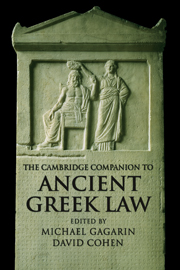Book contents
- Frontmatter
- Introduction
- Part 1: Law in Greece
- Part 2: Law in Athens I: Procedure
- Part 3: Law in Athens II: Substantive Law
- 11 Crime, Punishment, and the Rule of Law in Classical Athens
- 12 Gender, Sexuality, and Law
- 13 Family and Property Law
- 14 Athenian Citizenship Law
- 15 Commercial Law
- Part 4: Law outside Athens
- Part 5: Other Approaches to Greek Law
- Index
14 - Athenian Citizenship Law
from Part 3: - Law in Athens II: Substantive Law
Published online by Cambridge University Press: 28 August 2006
- Frontmatter
- Introduction
- Part 1: Law in Greece
- Part 2: Law in Athens I: Procedure
- Part 3: Law in Athens II: Substantive Law
- 11 Crime, Punishment, and the Rule of Law in Classical Athens
- 12 Gender, Sexuality, and Law
- 13 Family and Property Law
- 14 Athenian Citizenship Law
- 15 Commercial Law
- Part 4: Law outside Athens
- Part 5: Other Approaches to Greek Law
- Index
Summary
From Aristotle's perspective in the late fourth century, the question “who is a citizen (politēs)?” is one of the first questions that arise when thinking about the nature of the state. “The state,” he says at the opening of Book 3 of the Politics,
is composite, like any other whole made up of many parts - these are the citizens, who compose it. It is evident, therefore, that we must begin by asking, who is the citizen [politēs], and what is the meaning of the term? (1274b40-42)
After considering and then rejecting various options, such as those who “live in a certain place” or those who have the “legal right to sue or be sued,” as too broad, Aristotle arrives at the conclusion: “he who has the power to take part in the deliberative or judicial administration of any state is said by us to be a citizen of that state” (1275b19-21). He then dismisses the “practical” definition that a citizen is the child of citizen parents as not in fact much of a definition - e.g., what about the founder of a new state - is he not a citizen (1275b23-33)?
- Type
- Chapter
- Information
- The Cambridge Companion to Ancient Greek Law , pp. 267 - 289Publisher: Cambridge University PressPrint publication year: 2005
- 7
- Cited by

